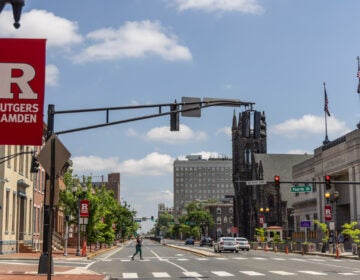Legal loophole allows some NJ part-time gov’t workers to make a killing

Open classic leather briefcase with stacks of hundred dollars
As the most expensive part-time temporary worker in New Jersey government last year, educator Ron Karsen can teach state taxpayers a hard lesson in economics.
Karsen has collected nearly $1 million from public coffers since July 2011. That was the month he retired as a Newark school principal and was hired into a NJ Department of Education program to help underperforming schools.
In 2015, NJDOE paid Karsen $138,300 as executive director of a Regional Achievement Center in Paterson. He also received a $97,916 a year state pension – thanks to a lucrative loophole in the law. His annual total was $236,216.
Karsen, who did not respond to requests for comment, resigned as a RAC director in November. But other highly-paid temps continue to take advantage of the system.
A NJ Spotlight investigation found 20 “Temporary Employment Service” workers were paid more than $75,000 by NJDOE last year while they received retirement checks from the Teachers’ Pension and Annuity Fund.
On average, they raked in $182,000 in 2015 – $102,000 in pay and $79,000 from pension. Overall, the combined cost was $3.64 million – $2.06 million from NJDOE and $1.58 million from TPAF. Generally, TPAF pension benefits must be suspended when retired educators return to work in public school systems. But when NJDOE hires them as TES workers, they are exempted from a pension rule intended to prevent double-dipping. So they can legally pocket both state pay and retirement checks, year after year.
It is simply business as usual, say state education officials.
“To be clear: This is a process that complies with law and is handled in a manner consistent with other administrations,” NJDOE spokesman Michael Yaple said in an email statement.
Yet it’s a matter of basic math to critics like Sen. Jennifer Beck (R-Monmouth) One six-figure temp plus one state pension equals too much of a burden for taxpayers.
“It’s insane that it’s legal,” said Beck. “The underlying problem is that we allow this in New Jersey – and it shouldn’t be allowed.”
Seven double-dipping TES workers on NJDOE’s payroll each raked in more than $200,000 last year. At the top of that list is Karsen, followed by:
• Laura Morana, $213,721 – Received $120,000 as interim county superintendent for Middlesex County plus $93,721 in pension as retired Red Bank schools superintendent.
• Judith DeStefano-Anen, $212,591 – $80,045 as interim education specialist for Ocean County schools; $132,546 as retired Stafford Twp. schools superintendent.
• Joseph Zarra, $209,735 – $114,800 as interim county superintendent in Essex County; $92,849 as retired Nutley schools superintendent.
• Rosalie Lamonte, $206,452 – $123,400 as interim county superintendent in Sussex and Warren counties; $83,052 as retired Mount Olive schools superintendent.
• Josephine McDowell, $205,101 – $114,500 as turnaround coach for a RAC in Essex County; $90,601 as a retired Newark schools executive.
• Catherine V. Coyle, $200,005 – $126,240 as special assistant to the state education commissioner; $73,765 as a retired Jersey City schools administrator.
“It tends to be the leadership, the top administrative folks, who get this privileged circumstance,” said Beck. “I haven’t found a ton of teachers doing this.” Yaple did not respond to questions about whether Education Commissioner David C. Hespe is concerned about how double-dipping temps may impact the state budget and pension funds.
Last year, 14 temps were paid six-figure sums by NJDOE. Twelve of them received TPAF pensions. In addition to Karsen, Morana, Zarra, Lamonte, McDowell and Coyle, the $100K TES payroll includes:
• Jocelyn Pickford – $137,987 as an education consultant; she does not collect a state pension.
• Robert H. Davis – $122,900 as interim county superintendent for Passaic County, plus $57,870 pension as Montclair Public Schools retiree. Total – $180,770
• Frances Borkes – $116,950 as intervention specialist for the Region 5 RAC (Middlesex, Monmouth, Ocean and Somerset counties), plus $58,383 pension as a retired Middlesex County vocational school administrator. Total – $175,333
• Richard Stepura – $114,800 as interim county superintendent for Atlantic and Cape May counties, plus $78,405 pension as retired Northfield schools superintendent. Total – $193,205
• Ave Altersitz – $109,664 as interim county superintendent in Gloucester County, plus $69,096 pension as retired superintendent of Kingsway Regional School District. Total – $178,760
• Iliana Okum – $107,850 as English language specialist for Region 5 RAC, plus $58,687 pension as retired Pemberton Township School District administrator. Total – $166,537
• William T. Anderson – $105,220 as literacy specialist for Region 5 RAC; he does not collect a state pension.
“The practice is not unique to the Department of Education,” said Yaple. “Departments use this approach to provide temporary specialized services.”
There is a difference. While other agencies in state government employ TES workers, only NJDOE paid temps more than $100,000 last year, according to state payroll records.
Yaple noted that all TES employees are temporary part-timers who are limited to 944 hours per year, unless the state Civil Service Commission grants exceptions.
But those exceptions are routine – and they defy common definitions of what is part-time and temporary. Karsen, for example, was credited for working 230.5 days – or 1,844 hours, based on eight-hour workdays – at $600 per diem in 2015. For four consecutive years, his annual pay from NJDOE exceeded $100,000.
Double-dipping is not limited to the ranks of NJDOE. It is also found in the offices of sheriffs, county prosecutors, the state attorney general, local school districts,state police and other governmental entities – including the state Legislature.
“You could go down a whole litany (of government agencies), and this is repeated time and time again,” said Beck. “I don’t have any problem with people going back to work but they shouldn’t be allowed to collect their pensions simultaneously.”
In an effort to halt double-dipping, Beck and a few other lawmakers have been proposing legislation since 2011. The latest is S-515, a measure that would suspend pension payments to retired officials who return to public jobs paying more than $15,000 a year.
None of Beck’s reform bills have reached the Senate floor for debate or votes, a process controlled by leadership in the majority party.
A spokesman for Senate President Stephen M. Sweeney did not respond to questions from NJ Spotlight. Such silence is not unusual since double-dipping is an issue most legislators widely ignore and rarely discuss in public, fearing backlash from taxpayers.
This year, that could change. A constitutional amendment on pension funding, proposed by Sweeney, will likely be decided at the polls by New Jersey voters in November.
The amendment would mandate full annual pension contributions by the state, starting with a $5 billion payment in 2021.
If approved, pensions for public workers would be given priority over all other general budget appropriations, including public safety, education, healthcare and other crucial services.
The bottom line is that double-dipping reform is likely to enter the pension debate as the election nears.
“No matter what party you belong to, you might want to find a way to lower the cost of the pension liability,” said Beck.
_______________________________________________________
NJ Spotlight, an independent online news service on issues critical to New Jersey, makes its in-depth reporting available to NewsWorks.
WHYY is your source for fact-based, in-depth journalism and information. As a nonprofit organization, we rely on financial support from readers like you. Please give today.




